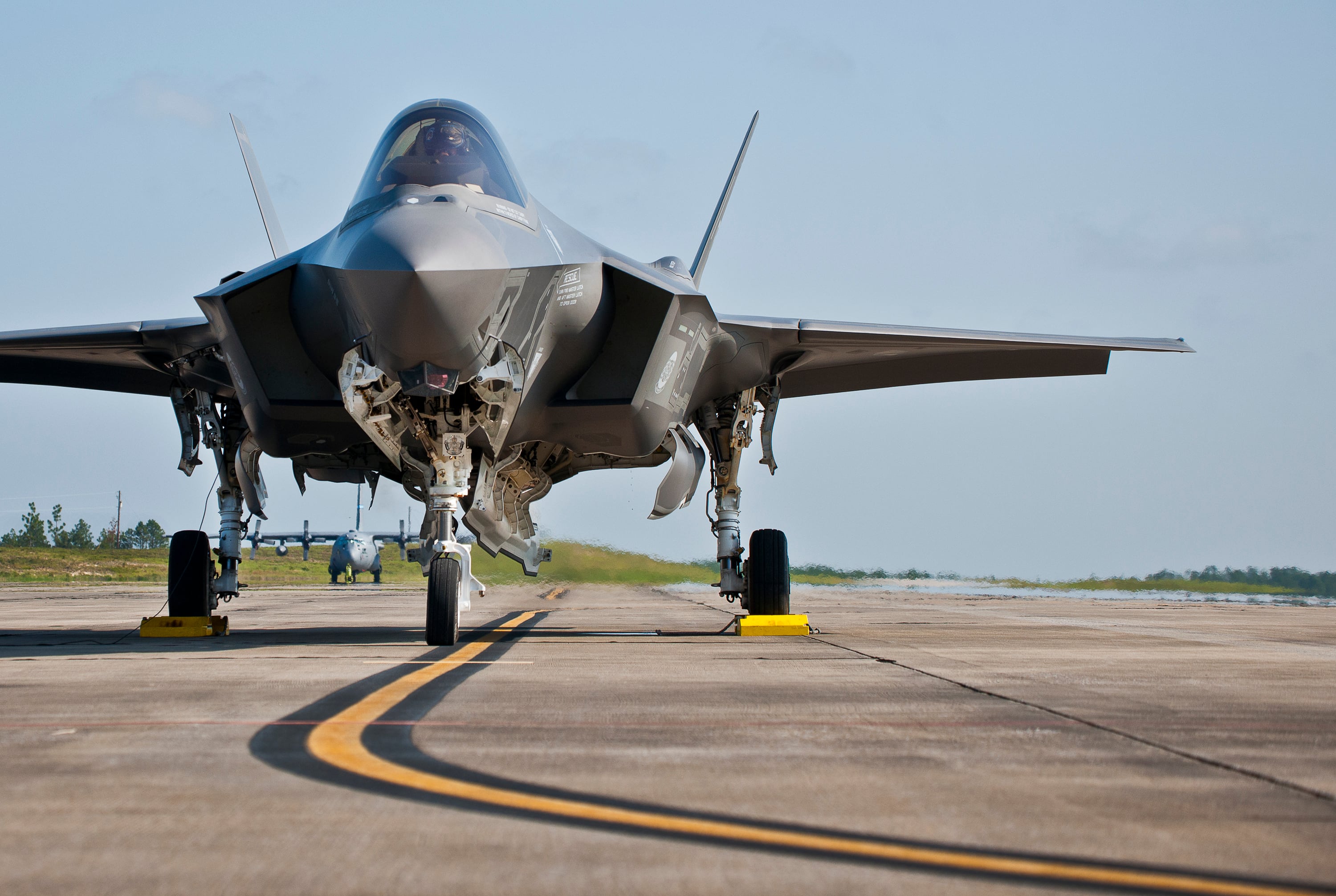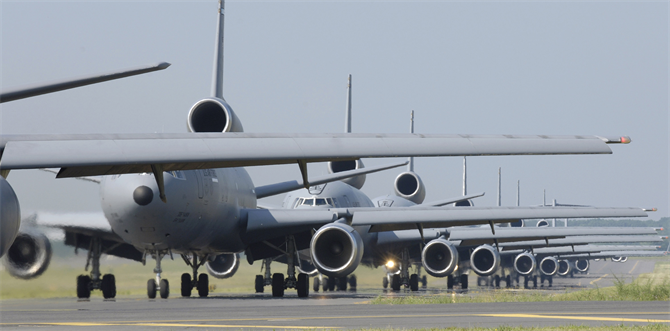President Trump has tapped several high-profile, high-powered veterans for his Cabinet, but most of his picks served in the Marine Corps or Army, leaving Air Force leaders wondering where the love is for their service.
Trump selected two recently retired Marine generals for two key national security roles -- James Mattis to be defense secretary and John Kelly to lead the Department of Homeland Security. Both men were confirmed by the Senate on Friday, just hours after Trump was sworn in.
Several other picks have an Army background, including Attorney General nominee Jeff Sessions, National Security Adviser Mike Flynn, and CIA Director Mike Pompeo. Sessions is awaiting Senate confirmation.
The Navy is on board, too. Interior Secretary nominee Ryan Zinke and Chief Strategist Steve Bannon both served in the Navy, and White House Press Secretary Sean Spicer is an officer in the Navy Reserve.
The Air Force presence, however, isn't as obvious. Rick Perry, nominated for Energy secretary, flew C-130s in the service for five years, but the more high-profile Cabinet positions have been pulled from other branches of the military.
"This is no slight against those who have been nominated," retired Gen. Larry Spencer, former vice chief of staff for the Air Force and current Air Force Association president. "It is sort of obvious that there aren't really any Air Force senior general officers [who were publicly interviewed by Trump's team.]"
Several Air Force experts say the Trump administration should take a look at the following candidates:
- Retired Gen. Mark Welsh, former Air Force chief of staff. Welsh, a retired four-star and Air Force Academy graduate, served as commander of U.S. Air Forces in Europe and as associate director for military support and affairs at the Central Intelligence Agency. Welsh was the Air Force's top general from 2012 to 2016, when he retired.
- Retired Gen. Philip Breedlove, former commander of U.S. European Command and NATO supreme allied commander. Breedlove is a command pilot with 3,500 flying hours, primarily in the F-16. The retired four-star served as the Air Force's vice chief of staff from 2011-12 and as commander of U.S. European Command and NATO supreme allied commander from 2013 to 2016.
- Retired Gen. Norton Schwartz, former Air Force chief of staff. Schwartz graduated from the Air Force Academy, and his assignments include commander of Special Operations Command-Pacific. Schwartz, who retired as a four-star in 2012, is a command pilot with more than 4,400 flying hours. He served as chief of staff of the Joint Special Operations Task Force during Desert Shield and Desert Storm.
- Retired Lt. Gen. William Welser, former commander of the 18th Air Force. Welser, a retired three-star, led the 18th Air Force at Scott Air Force Base, Illinois. He served as the operations and logistics director for U.S. Transportation Command, where he led operations supporting the response to 9/11. Welser, a command pilot with more than 3,500 hours, retired in 2005.
- Lt. Gen. James "Mike" Holmes, deputy chief of staff for strategic plans and requirements. Holmes leads the development and integration of Air Force strategy at Headquarters, U.S. Air Force. He was nominated in September by former President Barack Obama to lead Air Combat Command. A command pilot with more than 4,000 flying hours, Holmes also has more than 500 combat hours in the F-15.
- Lisa Disbrow, acting Air Force secretary. Disbrow will serve as the acting secretary of the Air Force until Trump's pick, Heather Wilson, is confirmed. Disbrow previously served as undersecretary and chief management officer of the Air Force. She is a retired Air Force Reserve colonel.
Spencer said he thinks the lack of interviews with Air Force candidates has to do with the service not being as prominent as the other branches.
"The four-stars that run the wars in Afghanistan and Iraq have been from one of the ground forces," he told Air Force Times. "I think that provides a certain amount of visibility and name recognition."
Over the past few months, Trump has addressed several issues relating to the Air Force, including the cost of Air Force One and F-35s.
In October, Trump questioned the joint strike fighter program when he found out it was $160 billion over budget.
"I do hear that it's not very good," he said during an appearance on the Hugh Hewitt radio show. "I'm hearing that our existing planes are better."
Lockheed Martin is currently closing in on a deal with the Defense Department that will drive down the cost on the F-35 program.
Trump also wanted the government to cancel an Air Force One deal with Boeing, saying it was too expensive.
Boeing said it will stick to scaled-down requirements to cut down the cost of the presidential jet.
Spencer said the discussions over Air Force One and the F-35 program bring up a good point of how critical the Air Force is when you delve into military issues.
"Many of the initial issues have been about air power or airplanes," he said. "You have to wonder if there is an airman [advising Trump] who really understands the F-35 or requirements of Air Force One or any of the other upgrades the Air Force needs."

A 33rd Fighter Wing F-35A Lightning II sits on the flightline after its first landing at Duke Field, Fla.
Photo Credit: Tech. Sgt. Sam King/Air Force
Rebecca Grant, president of IRIS Research in Washington, D.C., said Trump is asking the right questions about how the costs of these programs are so high.
"I think it's harder to get to know airmen and air power," said Grant, who has a background studying these topics. "I expect that we'll see Trump learning a lot about the role that airmen play in the global military enterprise."
Airmen don't often speak publicly about the very technical, complicated jobs they perform, so they're not in the spotlight as much, she said.
Spencer said the culture of the Air Force is to just get the job done.
"Let's get ourselves ready, and when we're called we go in, we don't do a dance in the end zone," he said. "We go back to the bench and wait to be called back up."
Grant said she thinks Trump will look around and see that there are some Air Force generals who can provide sound counsel.
"I'm sure he'll hit it off with [Chief of Staff Gen. Dave Goldfein]," she said. "I know he'll respect Goldfein for his combat experience."
The United States' foreign-policy options are dictated by the country's air power capacity, she said, and Trump has already shown he appreciates air power.
"He'll come to appreciate the Air Force," she said.
John Venable, senior research fellow for defense policy at The Heritage Foundation, said he sees two reasons why Trump hasn't tapped into the Air Force as much as the other services.
Like Spencer and Grant, Venable cites lack of visibility as one of the main reasons.
"The services with the large procurement packages are the ones that deal with Congress and have the biggest issues," he told Air Force Times.
Venable said he believes the second reason for the lack of appointees with an Air Force background stems from missteps in the service's past.
The 25-year Air Force veteran cited the tanker lease controversy and nuclear weapons negligence as two examples.

KC-10 Extenders and C-17 Globemaster IIIs from McGuire Air Force Base, N.J., taxi down the flightline during an emergency response exercise.
Photo Credit: Brian Dyjak/Air Force
In 2003, the Air Force wanted to lease 100 KC-767 tankers to replace the oldest KC-135s. The service could purchase the aircraft at the end of the 10-year lease, but critics said it was more expensive than needed. The Pentagon then froze the project amid an investigation of corruption between an Air Force official and Boeing's chief financial officer. Both were found guilty.
In 2007, six cruise missiles were mistakenly loaded onto a B-52 and transported from Minot Air Force Base to Barksdale Air Force Base. The nuclear warheads were supposed to be removed before the missiles were transported.
Venable said that the service hasn't bounced back from some of the missteps in the past, and it will take a "long period of time of well-thought-out program execution."
"Then we're going to have to run clean for a long time on leadership issues and character issues," he said.
He said he personally knows several four-stars in the Air Force — "these guys are incredible folks" — but usually the service is looked at before the individual person.
"If you look at how combatant commanders are selected, they're picked by folks who have respect for different branches of services rather than individuals in the service," Venable said.
However, the Air Force is getting back on track, he said.
"It’s going to take a generation of leaders — another four or five leaders before you see us start coming into the fray," he said.
Charlsy Panzino covers the Guard and Reserve, training, technology, operations and features for Army Times and Air Force Times. Email her at
.
Charlsy is a Reporter and Engagement Manager for Military Times. Email her at cpanzino@militarytimes.com.





